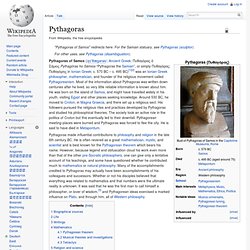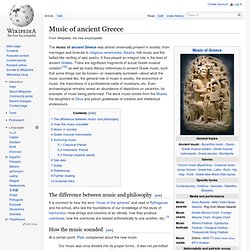

Pythagoras. Pythagoras of Samos (/pɪˈθæɡərəs/; Ancient Greek: Πυθαγόρας ὁ Σάμιος Pythagóras ho Sámios “Pythagoras the Samian”, or simply Πυθαγόρας; Πυθαγόρης in Ionian Greek; c. 570 BC – c. 495 BC)[1][2] was an Ionian Greek philosopher, mathematician, and founder of the religious movement called Pythagoreanism.

Most of the information about Pythagoras was written down centuries after he lived, so very little reliable information is known about him. He was born on the island of Samos, and might have travelled widely in his youth, visiting Egypt and other places seeking knowledge. Around 530 BC, he moved to Croton, in Magna Graecia, and there set up a religious sect. Music of ancient Greece. The music of ancient Greece was almost universally present in society, from marriages and funerals to religious ceremonies, theatre, folk music and the ballad-like reciting of epic poetry.

It thus played an integral role in the lives of ancient Greeks. There are significant fragments of actual Greek musical notation[1][2] as well as many literary references to ancient Greek music, such that some things can be known—or reasonably surmised—about what the music sounded like, the general role of music in society, the economics of music, the importance of a professional caste of musicians, etc. Music of the Ancient Greeks.
Hellenistic period. Roman imperial period.